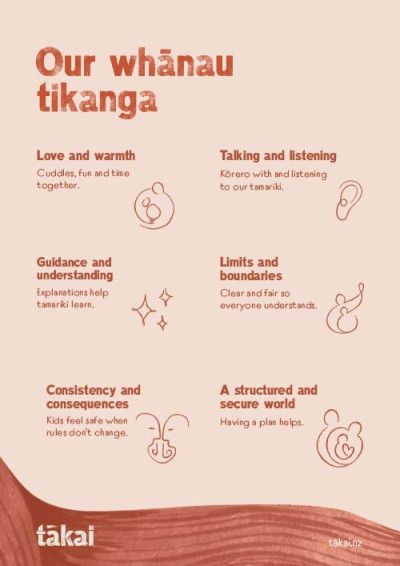
How the six principles apply to sleep
How the 6 principles relate to unsettled sleep and waking up during the night.
Research by the Children’s Issues Centre (University of Otago) and the Office of the Children’s Commissioner identified 6 key principles for effective discipline. These are summarised as '6 things children need to grow into happy capable adults'. They provide a great foundation for helping whānau manage kids’ difficult behaviours without having to hit or yell.
6 principles – unsettled sleep
How do the 6 principles relate to unsettled sleep and waking up during the night?
Te aroha me te mahana – love and warmth
This principle is important when dealing with night waking. It can be so easy to become angry and annoyed when nights of broken sleep are becoming a regular occurrence.
Parents can reach the point where they’re yelling louder than the wakeful child. Or they make random threats: “If you get out of bed one more time, you can go and sleep outside with the hedgehogs!” Or they might try bribes: “If you go back to sleep now, you can have McDonald’s for breakfast.”
Threats or bribes might work in the short term, but actually, staying calm and firm and sticking to a plan will have better results in the long run.
Te kōrero me te whakarongo – talking and listening
It can really help to make a whānau plan about what happens if kids wake up during the night, and talking with them about it before they go to sleep. Also, asking them why they think they keep waking up. Listening to their responses can help parents figure out what might be influencing their child’s unsettled sleep.
Talk with them about ‘other’ kids who wake in the night — what should their parents do with them when they are feeling so tired?
Be clear with children that during the night is the time for sleeping, not the time for talking or playing. Model this through keeping any interactions with them when they wake to a minimum. This helps children learn that night-time is a quiet time for resting and sleeping, for everyone in the whānau.
Te ārahi me te māramatanga – guidance and understanding
Help children understand that waking up in the night is normal. Explain to them that sometimes parents also wake during the night, and then they go back to sleep. Maybe they need to go to the toilet, get a drink of water, or fix their bedding before returning to their bed and sleeping — and that’s what children need to do too.
Being clear about what is going to happen if children are wakeful during the night can help both kids and their parents. When everyone understands ‘the drill’, it can help to keep the situation a lot calmer. The child knows what to expect, and parents are more likely to stick with their plan.
When kids understand why we want something done, they’re more likely to do it. Explaining works better than orders, threats or bribes.
Te tūāpapa mō te tika me te hē – limits and boundaries
It helps to have clear and simple guidelines for night-times that children understand. Rules keep things safe and fair for everyone. It can help to talk things through with children, explaining how sleep routines and rules for night-times are ways that parents help keep their kids safe and healthy.
There are occasions when the boundaries may need to be more flexible. Obviously, illness is one of those times. A sick or feverish child needs attention and monitoring and will likely want more soothing too. So, although limits and boundaries do help children learn to feel secure, there are times when care and cuddles from parents are more important for giving them a sense of security.
Te mahi pono — ngā hua me ngā hapa – consistency and consequences
Children feel safe when the rules don’t change. Knowing what the rules are is priority number one, and number two is that they’re consistently applied. If rules change from night to night depending on parents' mood or their level of tiredness, it gives a message that there might be some wriggle room, and if you can scream loud and long enough, things might change.
We help kids by keeping our responses to their night waking:
- related directly to what has happened: “I think you’ve woken up because you’re cold, let’s tuck you back into your warm bed so you can go back to sleep — goodnight.”
- reasonable — for their developmental age and understanding: “I think that noisy rain on the window has woken you, lucky you have a nice warm bed to snuggle back into — goodnight.”
- respectful — firm and fair, not humiliating: “Night-time is quiet time remember, lay down in your bed and I’ll tuck you in — goodnight, see you in the morning.”
Te hanga ao tōtika, ao haumaru – a structured and secure world
Kids feel happy and relaxed when they know what’s happening. It’s important to plan ahead for possible night-time challenges. For example:
- have a night light and a soft toy or a cuddly that can help them to feel more secure
- wear appropriate nightwear for the surroundings
- give a reminder to use the toilet directly before getting into bed
- talk through your whānau plan with them at bedtime: “What do we do if we wake during the night?”
- read books about children who wake and feel scared or upset at night.
And remember to model the behaviour we want kids to copy — don’t throw an ‘adult tantrum’ when things are frustrating or annoying.











